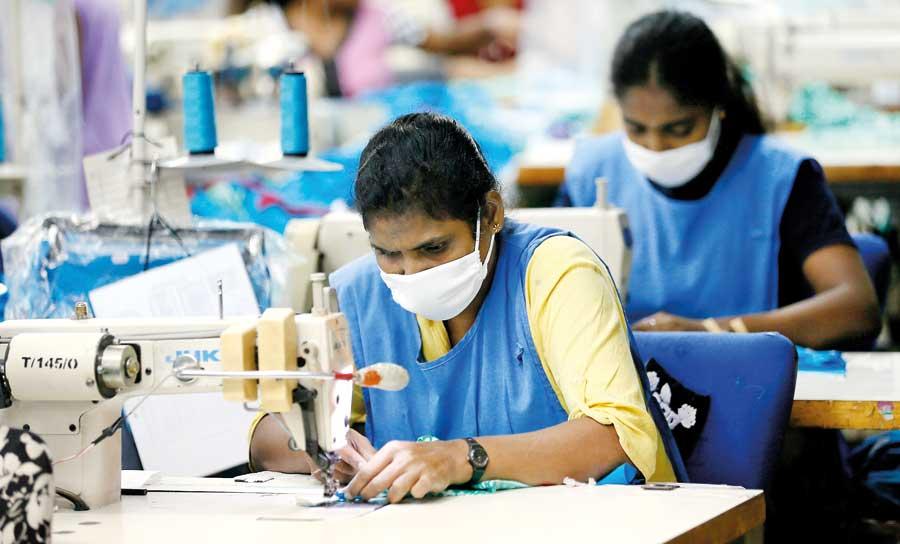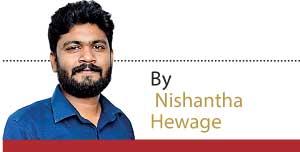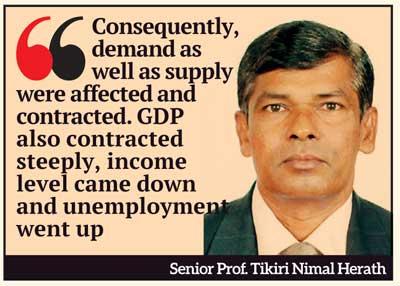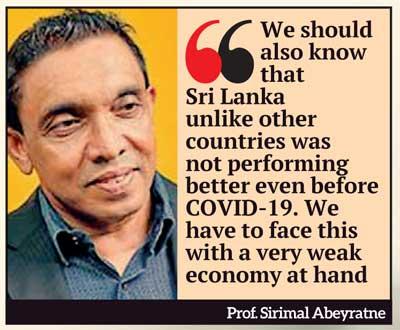Reply To:
Name - Reply Comment
Last Updated : 2024-04-25 20:04:00
The recent United Nations Educational Scientific and Cultural Organization’s (UNESCO) report titled, “Tackling the COVID-19 economic crisis in Sri Lanka: Providing universal, lifecycle social protection transfers to protect lives and bolster economic recovery” has assessed the impact of the Covid-19 pandemic on the Sri Lankan economy.

The report estimates that the Sri Lankan economy could shrink by 3%. It further mentions if the crisis persists for a six-month-period, the incomes of the citizens in Sri Lanka may fall by LKR 803 billion averaging LKR 134 billion a month. This represents 5% of the 2019 Gross Domestic Product (GDP)-the total value of goods produced and  services provided in a country during a year. Given this backdrop the Daily mirror spoke to a few economists in Sri Lanka to assess
services provided in a country during a year. Given this backdrop the Daily mirror spoke to a few economists in Sri Lanka to assess
prevailing economic condition and beyond.
“However, after the lockdown, the country could control the spread of disease and was able to flatten the curve. Unfortunately, a few weeks back, another cluster of Covid-19 developed in the country. Now, some people are concerned about a second wave of Covid-19. It is said that a century ago, the second phase of a Spanish flu was deadlier than the first. So, would the second wave be inevitable? However, the impact would depend on the extent of the outbreak of the disease. One reason to keep in mind is that our airport is still closed,” said Senior Prof. Tikiri Nimal Herath of the University of Sri Jayewardenepura. He said that once the impact of the pandemic is analysed anybody can easily understand that the interruption of free movement, wearing masks and maintaining physical distance have undermined almost all economic activities in the market. “Consequently, demand as well as supply were affected and contracted. GDP also contracted steeply, income level came down and unemployment went up,” Prof. Herath added. He also made it a point that since the economic transactions were confined to the domestic market, foreign investments had been negatively affected.
Referring to the GDP growth he said that the average GDP growth rate during the 2017-2019 period had been 3% in Sri Lanka. “If the second wave is so strong, in 2020, the pandemic may pull the economy backwards. Therefore, everybody’s duty is to assist each another to keep transmission under control,” he added. 
“Today 1.3 billion people in developing countries are multi-dimensionally poor and 600 million people are living in extreme poverty according to United Nations Development programme (UNDP). In terms of the national poverty line, 4.1% of people were poor in 2016 in Sri Lanka,” Prof. Herath said. He also said once the poverty was measured in terms of international poverty lines, the picture was different. He said The World Bank (WB) showed that in 2016, 0.8 and 10 per cent of people belonged to poor groups according to the poverty line of less than 1.9$ and 3.2$ per day respectively. “The poor are powerless and voiceless and hence have less strength to face the pandemic,” he noted. He said COVID-19 led the market to impose more constraints on the poor. He also pointed out that the scarcity of job opportunities and low affordability had deteriorated the standard of living.
Regarding the Government’s role, Prof. Herath said that the Government was the political and economic leader of a country and therefore it should play a vital role in acquiring growth and development. “In post-independent Sri Lanka there are some questions raised regarding the role of the state in economic development. It is in this context that COVID-19 emerged,” he added. He said that first the Government had increased the public health expenditure and transferred payments to the vulnerable sections of the country. He also highlighted that the tax revenue of the Government had decreased due to the low rate of GDP. He said that the Government had already taken some steps to promote growth and to revive the economy. He identified broadening investment opportunities by decreasing interest rate and granting moratoriums to the entrepreneurs with regard to loan repayments as steps taken by the government. “However, to reap productive results from these attempts, the Government needs to look into other areas like combating corruption, effective enforcement of the law and controlling crimes and strengthening the efficiency of public services,” he said.
"Sri Lankan economy during Covid-19 and beyond"
Speaking to the Daily mirror, Prof. Sirimal Abeyratne of Colombo University said, “There are three channels which have affected the Sri Lankan economy in the context of the COVID-19 pandemic. He said that the first channel was a strict lockdown strategy. “For Sri Lanka, a strict lockdown strategy was necessary,” said Prof.Abeyratne. Explaining the reason for a strict lockdown he went on to state that Sri Lanka had a weak health capacity and a lower level of infrastructure. “If we compare the Sri Lankan health sector statistics with the rest of the world, we are far below compared to the middle income countries. “Without a strict lockdown strategy it would have been very difficult for the country to manage the situation,” he added. He said that the economic impact was far greater. He noted that there had been a loss of production, decrease in consumption and distribution, loss of income and jobs.
|
Economists point out that if Sri Lanka wants to sustain a higher level of economic performance it should focus on the international market |
Prof. Herath underscored the breakdown of the country’s international connectivity as the second channel which has adversely affected the Sri Lankan economy. “The spread of COVID-19 does not affect the regions and countries at the same time. It spreads at different times in different regions. Even if we are recovered it is not going to be a normal situation until and unless the rest of the world comes to that point. It is very unlikely this year. So the impact comes through the loss of trade— a reduction in both exports and imports. The economic activities related logistics such as port services and aviation services, tourism, remittances and activities of our supply chain have been adversely affected,” he affirmed.
While discussing the third channel, Prof. Abeyratne said that the combined effect of all these things were heading to a far greater world economic crisis. “The USA, Western Europe (Euro zone), the UK, Japan and China produce two thirds of the world’s income. They all have reported negative growth rate in the first quarter and the second quarter growth rate is going to be worse,” he added. He said that Sri Lanka will have to face the consequences of this recession. “We didn’t face the consequences of the global financial crisis in 2009. We didn’t feel it that much. Our growth rates slowed down, but we didn’t come to a negative growth rate. But this time it is different. This is how the local economy is impacted,” he stressed.
Emphasising both on the short and long-term measures Prof.Abeyratne said, that the Government had already  taken the short-term measures to counter the negative impact of the pandemic on the economy. “The entire burden is on the monetary stimulus and that means money printing and money pumping by the Central Bank. Even if the treasury spends, that comes from the lending from CB to the Government. So our entire effort is based on the monetary policy stimulus. The world is typically adopting these two kinds of policies as short term methods. Even in rich countries monetary expansion has a long history even before this issue. They have done print, issue and pump more money as unlike before in history while driving down the interest rates even into negative level. Through this they have been expecting to avoid deflation and stimulate the economic activity. But they have now reached the limits of going with these negative interest rate strategies. That is the situation in rich countries,” said Prof. Abeyratne.
taken the short-term measures to counter the negative impact of the pandemic on the economy. “The entire burden is on the monetary stimulus and that means money printing and money pumping by the Central Bank. Even if the treasury spends, that comes from the lending from CB to the Government. So our entire effort is based on the monetary policy stimulus. The world is typically adopting these two kinds of policies as short term methods. Even in rich countries monetary expansion has a long history even before this issue. They have done print, issue and pump more money as unlike before in history while driving down the interest rates even into negative level. Through this they have been expecting to avoid deflation and stimulate the economic activity. But they have now reached the limits of going with these negative interest rate strategies. That is the situation in rich countries,” said Prof. Abeyratne.
Referring to the Sri Lankan economy, Prof.Abeyratne said that there was no space for fiscal stimulus. “It is the very reason that even the treasury bank has to depend on the CB (Central Bank) borrowings. We have little space for money pumping and lower interest rates. We have been adopting that. We should also know that Sri Lanka unlike other countries was not performing better even before COVID-19. We have to face this with a very weak economy at hand. COVID-19 emerged during one of the worst times in history,” he added
As long as long-term solutions are concerned, economic revival is not just enough, Prof.Aberatne said. He stated that the economic revival meant going back to the pre-COVID-19 growth rate. “We need an economic revival and should go beyond that. We need to look into the opportunities even during a trying period. Economic revival is achieving 2 to 3 % growth rate. Even raising that growth rate to 5 to 6 % is important. We should have a good assessment of why Sri Lanka failed to sustain a high rate of growth and how we can stimulate investments and achieve fast export expansion,” he noted. He also stressed that the importance of a strong connectivity to the rest of the world. “One important economic principle that we need to know is that our progress is limited by the size of the market.” He said that if Sri Lanka wants to achieve higher progress, the market has to be internationalised. Identifying the price of the market as a factor that has limited the progress he said that if Sri Lanka wants to sustain a higher level of economic performance; it should focus on the international market.

Add comment
Comments will be edited (grammar, spelling and slang) and authorized at the discretion of Daily Mirror online. The website also has the right not to publish selected comments.
Reply To:
Name - Reply Comment
US authorities are currently reviewing the manifest of every cargo aboard MV
On March 26, a couple arriving from Thailand was arrested with 88 live animal
According to villagers from Naula-Moragolla out of 105 families 80 can afford
Is the situation in Sri Lanka so grim that locals harbour hope that they coul